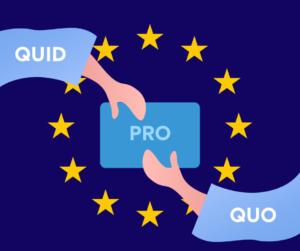Headquarters: Svetog Nauma 7, 11000
Office address: Đorđa Vajferta 13, 11000
Phone:: +381 11 4529 323

Greece today: shut-down banks, capital controlled, and fear of liquidity drying-up. Our lives are paused until Sunday and people are set on two opposite camps. I will not go into elaborating on the constitutionality and fairness of the announced referendum. It is a fact and we need to face it as such. We can, however, analyse this post-result.
I am a supporter of “yes”. Not because I have vested interests or because I am following political leaders blindly but because it is the only choice having taken into consideration all the following elements:
1. The referendum’s question is about approving the proposed adjustment programme of 25 June. It is not asking “are you with the Euro or not?”
Myth. Firstly, this draft proposal is no longer on the table. Second, the government has not made this document available to the Greek public, not even in its original version in English. Third, our EU partners have openly explained that after a “no” there is no longer a possibility to negotiate bailout terms. So, de facto, if our banks run out of Euros, and the ECB does not lend us more, what will we do? We will need to print our own currency.
2. The austerity measures were only deepening the crisis.
Fact. Two adjustment packages for the bailout of Greece consisted of unfair, strict austerity measures that focused on over-taxation, and were targeting the middle and lower classes.
2. The IMF, the ECB, the Eurogroup and the European Commission, have a harsh stance towards Greece.
Fact. Even after proven inefficiency, they stick on the same austerity measures with little or no reformist measures.
3. Greece is only a victim.
Myth. It is not breaking news that Greece has never been a “good” EU Member State. The EU was seen as a cash cow; European funds have not been used wisely; Greece was late to transpose EU legislation. And after the crisis occurred, we kept on not responding to our obligations. Some claim this is irrelevant to the current deadlock. I disagree. Even if setting the attitude towards the EU aside, none of the recent Greek governments has had the guts to take the political responsibility to impose reforms that would boost growth and lead us out of the crisis. It would not be easy; it would demand additional sacrifices from the Greek people – especially since reform measures would need to be coupled with austerity measures – but it would be the only solution.
3. It is all about negotiation tactics.
Myth.Actually, not at all. The current government won last elections under this flag with the dogma that austerity measures were due to previous government’s incapacity to negotiate well. The truth of the matter is that we failed to apply a proper reform programme so far because the governments were not proper players. Failure was due to their entrapment into populist and clientelist practices. Driven by Mr Varoufakis to put into practice his infamous “game theories,” we launched a power game which transformed Greece from partner to enemy.
4. The debt is illegal, illegitimate, unsustainable and odious. Write it off.
An irrelevant fact! Yes, in 2009 something tragic happened: Greece could not borrow from the markets and had to be bailed-out. Yes, the incapacity to borrow was set off as Greece was blurring information on the country’s huge public debt which triggered downgrading from illicit rating agencies. Yes, measures taken under the adjustment programmes were politically oriented and the debt is not sustainable. Yes, we should decouple irrational financial transactions from real economy. However, erasing the debt would not heal the severely sick Greek economy. And let’s face it. Now we have borrowed from sovereign countries; not from faceless markets… They want their money back!
I believe all my fellow citizens are taking positions either “yes” or “no” with sincere motives. Still, I think that the argument behind the support of the “no” – that it will lead to a better negotiating position – is wrong and extremely risky.
It became crystal clear the Greek government’s poker game has turned into a Russian roulette lot, with a known position of the bullet in the calyx. And a “no” outcome on Sunday would be synonymous to pulling the trigger.